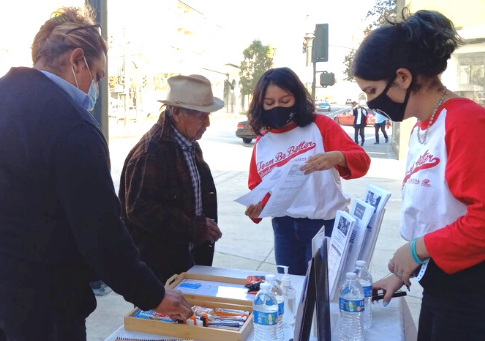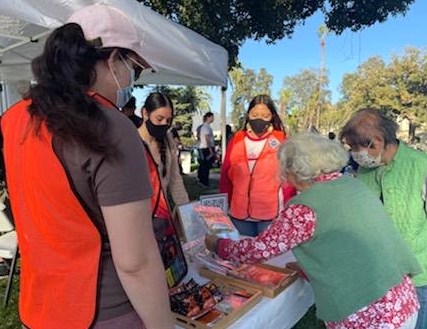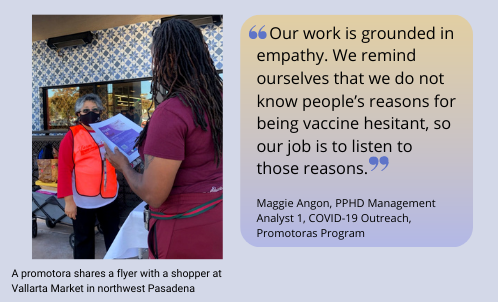 Promotoras engaging passerby at the Memorial Park Metro Station in Old Pasadena
Promotoras engaging passerby at the Memorial Park Metro Station in Old Pasadena
It’s early March 2022, and cases of COVID-19 are in decline, emergency pandemic rules are easing, and here in Pasadena, 92.7% of Pasadena’s residents have been fully vaccinated to date. The Pasadena Public Health Department (PPHD) has created numerous partnerships to reach that number over the last year, and Pasadena Community Foundation has been instrumental in helping fund several of them. PCF funded one of the city’s most recent and innovative phases of vaccine outreach, the Promotora Program.
A Model That Emphasizes Cultural Connections
While early vaccination efforts were fairly successful in Pasadena, by May 2021 it was clear that health disparities among populations of color persisted: Black and Brown residents in Pasadena continued to be disproportionately infected with the virus, and vaccine adoption rates were lower among these populations.
To address that inequity, the City of Pasadena Public Health Department (PPHD) proposed an innovative model centered on promotoras to help improve COVID-19 vaccination rates in Pasadena. Promotoras are lay health workers who promote public health initiatives in the field by leveraging their familiarity with cultural touchpoints and local histories. Many also speak Spanish to forge a deeper connection. Their work takes place in neighborhoods that are underserved and where mistrust and misinformation are often prevalent. Recognizing the program’s potential, PCF stepped in to fund it, enabling it to move forward in assisting vaccine-hesitant residents or those who lacked transportation, technology, and information to secure vaccines on their own.

Meaningful Conversations Without Judgement
Margarita Angon, who works at PPHD’s Health Promotion & Policy Development Division, oversees Pasadena’s Promotora Program, which began in late summer 2021 with the recruitment of nine women. First on their agenda: hosting several tabling events located at community hubs like laundromats, Vallarta Supermarket, the Villa Park Farmer’s Market, Memorial Park Metro Station, and local businesses along the Orange Grove and Washington Boulevard corridors. These informal events are designed to be welcoming and share valuable information about public health. By early 2022, the promotoras have hosted more than 700 tabling events at 25 unique locations throughout northwest and central Pasadena.
Agnon notes that “tabling has allowed us to have meaningful one-on-one conversations, which is an important aspect of our model. We are not focused persuading or convincing people to get vaccinated. We are there to dispel myths and use key facts and messaging. Our first step is always listening with no judgement. We say to them, ‘we’re here to learn,’ and when they hear that, they often more open to talk.”
In late 2021, PPHD secured additional grants to supplement PCF’s funding, allowing the Promotora Program to expand into phone banking, door-to-door visits, and presentations at nonprofit agencies. When those grants end, the remaining PCF funding will allow PPHD to extend the original program from its anticipated end date of December 2021 to at least June 2022.

An Evolving Tool for Public Health Outreach
When the Promatora Program began in September 2021, 86% of Pasadena residents were fully vaccinated. By late February 2022, that number had grown to 92%. The numerous and valuable public-private partnerships over the last year can be credited with that phenomenal percentage, the Promotora Program included.
Following the promotoras’ success with the COVID-19 vaccination outreach efforts, Agnon sees opportunities for the program to expand in support of additional health initiatives. “Building trust and building bridges to PPHD and other local resources is instrumental to improving community health outcomes. We hope the Promotora Program can continue for a very long time and evolves to include other PPHD programs needed in the Pasadena community.”

